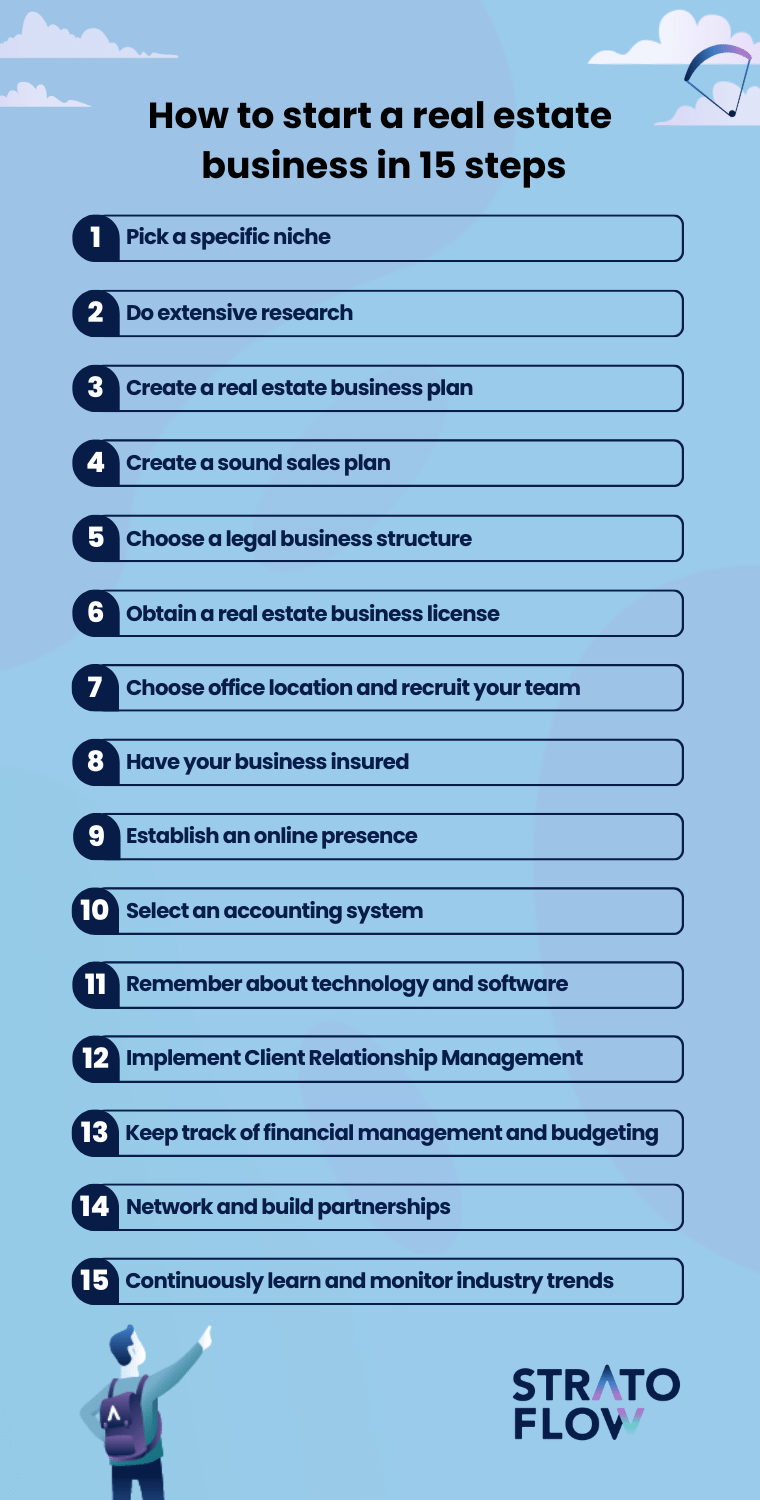To start a real estate business, conduct market research and create a solid business plan. Secure financing and obtain necessary licenses.

Starting a real estate business can be a rewarding venture with significant growth potential. Begin by conducting thorough market research to understand your target market and competition. Create a detailed business plan outlining your objectives, strategies, and financial projections. Secure the necessary financing through loans or investors to fund your startup.
Obtain the required licenses and certifications to operate legally in your area. Build a strong network with industry professionals, including real estate agents, brokers, and contractors. Invest in marketing to establish your brand and attract clients. Focus on providing excellent customer service to build a positive reputation and ensure long-term success.
How to Start a Real Estate Business proven Guide below..

Credit: www.mashvisor.com
Understanding The Real Estate Market: Key Insights
Gaining a deep understanding of the real estate market is essential for anyone looking to start a successful business in this field. A comprehensive analysis of market trends, property values, and local economic conditions can provide invaluable insights. Researching the current demand and supply dynamics helps identify lucrative opportunities and potential challenges.
Evaluating neighbourhood growth patterns and development plans can give a clearer picture of future prospects. Engaging with industry experts and attending real estate seminars can further enhance your knowledge. Additionally, staying updated with the latest market news and reports ensures you remain informed about any significant changes.
This foundational knowledge is crucial for making informed decisions and developing effective strategies to thrive in the real estate sector.
Developing A Comprehensive Real Estate Business Plan
Crafting a comprehensive real estate business plan is essential for success in this competitive industry. Start by conducting a thorough market analysis to understand the demand and competition in your chosen area. Identify your target audience and tailor your services to meet their needs.
Next, outline your business goals and create a step-by-step strategy to achieve them, including marketing and financing plans. It’s crucial to detail your operational plan, specifying the roles and responsibilities of your team members. Lastly, include financial projections and budgets to ensure you have a clear picture of the potential profitability and costs associated with your venture.
Legal Requirements And Licensing For Real Estate Professionals
Navigating the legal landscape of starting a real estate business involves understanding licensing requirements specific to your state or country. Each region mandates certain qualifications and certifications for real estate professionals. These often include passing a licensing exam, completing pre-licensing education, and adhering to ongoing education requirements.
It’s essential to remain updated on local regulations, as laws can frequently change. Additionally, securing professional liability insurance protects against potential legal claims. Building relationships with legal advisors ensures compliance with zoning laws, contract regulations, and property disclosures. Ensuring all legal aspects are covered provides a solid foundation for a successful real estate venture.
Choosing Your Real Estate Niche: Residential Vs. Commercial
Selecting the right real estate niche can significantly impact the success of your business. Residential real estate focuses on properties intended for individual or family living, such as houses, apartments, and condos. These properties generally have a high demand due to the constant need for living spaces, making it a potentially stable investment.
On the other hand, commercial real estate involves properties used for business purposes, like office buildings, retail spaces, and warehouses. This niche often requires a larger initial investment but can provide substantial returns through long-term leases and higher rental rates.
Each niche comes with its own set of challenges and opportunities, so understanding your market and financial capabilities is crucial for making an informed decision.
Funding Your Real Estate Venture: Options And Strategies
Exploring various funding options is crucial for launching a successful real estate business. Entrepreneurs can consider traditional bank loans, which offer competitive interest rates and structured repayment plans. Alternatively, private lenders might provide more flexible terms, though often at higher interest rates.
Crowdfunding has emerged as a popular option, allowing multiple investors to contribute smaller amounts, thus spreading risk and diversifying investment sources. Personal savings also play a significant role, offering a debt-free start but requiring substantial initial capital. Real estate partnerships present another viable strategy, where combining resources with partners can enhance buying power and share financial risks.
Each funding option comes with its unique benefits and challenges, demanding careful consideration to align with business goals and financial capabilities.
Building A Strong Real Estate Team: Essential Roles And Skills
Assembling a proficient real estate team is crucial to the success of your business. Begin by hiring a knowledgeable real estate agent who understands the local market intricacies. Seek out a marketing expert adept in both traditional and digital marketing strategies to attract potential clients effectively.
It’s equally important to have a skilled property manager who can handle day-to-day operations and tenant relations. An experienced real estate attorney will ensure all transactions are legally sound and protect your business from potential legal issues. Incorporating a financial advisor will help you manage budgets, investments, and financial planning, ensuring the business remains profitable.
Each of these roles brings specialized skills that collectively contribute to a robust and efficient real estate team.
Marketing Your Real Estate Business: Effective Strategies And Tips
Building a strong marketing strategy for your real estate business involves leveraging various online and offline channels. Establishing an online presence through a professional website and active social media profiles can attract potential clients. Content marketing, such as blogging and video tours, provides value to your audience and showcases your expertise.
Engaging in local community events and networking with other industry professionals helps in building relationships and trust. Utilizing email marketing campaigns to keep in touch with prospects and previous clients ensures you stay top of mind. Investing in search engine optimization (SEO) increases your website’s visibility, driving more organic traffic.
Setting Up Your Office: Tools And Technology For Success
Establishing a well-organized office space is crucial for the success of your real estate business. Essential tools like a reliable computer, high-speed internet, and a multifunction printer can streamline daily operations. Investing in real estate software that handles property listings, client management, and financial tracking will significantly enhance productivity.
Cloud storage solutions ensure that important documents are easily accessible and securely backed up. Utilizing communication tools such as video conferencing software and a professional email service helps maintain seamless interactions with clients and colleagues. A comfortable and ergonomic workspace can boost efficiency and reduce fatigue, making long hours more manageable.
Equipping your office with these technologies and tools sets a strong foundation for your real estate venture.
Networking And Building Relationships In The Real Estate Industry
Connecting with others and forming strong relationships is crucial in the real estate industry. Establishing a network can provide valuable insights, opportunities, and referrals that can significantly boost your business. Attending industry events, joining local real estate associations, and participating in online forums are effective ways to meet potential clients and partners.
Developing genuine connections involves active listening and offering assistance without immediate expectations. Social media platforms also play a pivotal role in maintaining and expanding your network. Regularly engaging with your contacts through comments, shares, and messages can keep you on their radar.
Being approachable, professional, and consistent in your interactions will foster trust and reliability, essential traits for long-term success in real estate.
Understanding Real Estate Investment: Opportunities And Risks
Real estate investment offers a wide array of opportunities that can lead to substantial financial gains. Potential investors can explore various property types such as residential, commercial, and industrial real estate, each with its own set of advantages. For instance, residential properties often provide steady rental income, while commercial properties can yield higher returns due to longer lease agreements.
Risk assessment is crucial in this domain, as market fluctuations and economic downturns can significantly impact property values. Thorough research and due diligence are essential to understand local market trends and property conditions. Networking with industry professionals can provide valuable insights and help mitigate risks associated with real estate investments.
Finding Your First Clients: Tips For New Real Estate Agents
Connecting with your first clients as a new real estate agent can be challenging yet rewarding. Building a strong network starts with leveraging your personal connections. Friends, family, and acquaintances can be a valuable source of referrals. Hosting open houses offers a practical way to meet potential clients and showcase your expertise in the market.
Engaging on social media platforms can also expand your reach; sharing market insights and property listings helps establish your online presence. Participating in community events allows for face-to-face interactions, fostering trust and credibility. Joining local real estate groups or associations provides opportunities for mentorship and networking, which can lead to client referrals.
Managing Finances: Accounting And Budgeting For Real Estate Businesses
Efficiently managing finances is crucial for the success of any real estate business. Setting up a robust accounting system helps track income, expenses, and profits, ensuring that all financial activities are well-documented. Creating a detailed budget allows for better financial planning, highlighting areas where costs can be minimized and profits maximized.
Regularly reviewing financial statements provides insights into the business’s economic health, enabling timely adjustments. Investing in accounting software can streamline financial management, reducing errors and saving valuable time. Seeking professional advice from accountants or financial advisors ensures compliance with tax regulations and enhances financial decision-making.
Leveraging Social Media For Real Estate Success
Leveraging social media can significantly boost your real estate business. Engaging with potential clients through platforms like Facebook, Instagram, and LinkedIn enables real estate professionals to showcase properties effectively and build a strong online presence. By sharing high-quality images, virtual tours, and client testimonials, real estate agents can create an appealing and trustworthy brand image.
Interacting with followers through comments and direct messages fosters a sense of community and responsiveness, crucial for converting leads into clients. Consistently posting valuable content, such as market updates and home-buying tips, keeps your audience informed and engaged, ultimately driving more traffic to your listings.
Understanding Property Valuation And Appraisals
Understanding property valuation and appraisals is crucial for anyone venturing into the real estate business. Appraisals provide an estimate of a property’s market value, which is essential for setting a competitive price and securing financing. Knowledge of local market trends, comparable property sales, and specific property features such as size, condition, and location is vital.
Professional appraisers use these factors to determine a property’s worth, ensuring that buyers and sellers make informed decisions. Accurate valuations help prevent overpaying or underselling, and they build trust with clients. Investors can also use this information to identify lucrative opportunities and mitigate financial risks.
Navigating Real Estate Contracts And Negotiations
Navigating real estate contracts and negotiations can be complex, but understanding the basics helps. Successful negotiation begins with thorough preparation. Knowing the property’s market value, the motivations of the other party, and having a clear idea of your own priorities can make a significant difference.
During negotiations, maintaining a professional demeanor and being prepared to compromise on certain terms can lead to a more favorable outcome. It is essential to read every clause in a contract meticulously. Engaging a real estate attorney to review documents ensures that all legal aspects are covered, protecting your interests.
Clear communication and timely responses often facilitate smoother transactions.
Creating An Online Presence: Website And Seo Best Practices
How to Start a Real Estate Business Online. Building an online presence is essential for any real estate business. Start by developing a professional website that reflects your brand and services. A user-friendly design with easy navigation can significantly enhance the user experience. Incorporate high-quality images and detailed property descriptions to attract potential clients.
How to start a real estate business using SEO. Implementing SEO best practices is crucial to ensure your website ranks well on search engines. Conduct thorough keyword research to identify terms your target audience is searching for and integrate these keywords naturally throughout your website content. Additionally, focus on local SEO by optimizing your site for location-based searches.
Ensure your website is mobile-friendly, as a significant portion of users access real estate listings via smartphones. Regularly update your content and maintain a blog to keep your audience engaged and improve your search engine ranking.
Exploring Real Estate Management Software And Tools
How to start a real estate business or how to use software. Modern real estate management software and tools offer essential support for running a successful business. These tools streamline various tasks such as property management, client communication, and transaction processing. By integrating advanced features like CRM systems, document management, and financial tracking, these software solutions enhance efficiency and reduce manual workload.
Many platforms also provide analytics and reporting capabilities, helping business owners make informed decisions. Customizable interfaces allow users to tailor the software to their specific needs, ensuring optimal performance. Embracing these technologies not only improves operational efficiency but also enhances client satisfaction, ultimately driving growth and success in the competitive real estate market.
Staying Compliant: Real Estate Laws And Regulations
Understanding the intricacies of real estate laws and regulations is crucial for any successful real estate business. Navigating these legal requirements ensures that your operations remain compliant and avoid potential penalties. It’s essential to familiarize yourself with local, state, and federal laws that pertain to property transactions, zoning, and landlord-tenant relationships.
Staying updated with any changes in legislation can help you adapt your business practices accordingly. Engaging with a knowledgeable real estate attorney or consultant can provide valuable insights and guidance. Implementing a robust compliance program within your business can safeguard against legal issues and foster trust with clients.
Continuous Learning: Staying Updated With Real Estate Trends
Staying updated with real estate trends is crucial for the success of your business. One effective way to stay informed is by subscribing to industry newsletters and joining professional organizations. These resources often provide the latest news, market analysis, and valuable insights from industry experts.
Attending real estate seminars and webinars can also be highly beneficial, offering opportunities to learn from seasoned professionals and network with peers. Additionally, keeping a close eye on local market changes and consumer behaviour can help you anticipate shifts and adapt your strategies accordingly.
By continuously educating yourself and staying engaged with the real estate community, you position your business for sustained growth and success.
Handling Customer Service And Client Relations In Real Estate
Building strong client relationships is crucial in the real estate business. Excellent customer service forms the backbone of these relationships. Promptly responding to inquiries and addressing concerns shows clients that their needs are a priority. Personalizing interactions by remembering details about clients’ preferences can go a long way in establishing trust.
Clear and honest communication helps manage expectations and prevent misunderstandings. Following up with clients after transactions can demonstrate continued commitment to their satisfaction. Being proactive in providing updates and market information positions you as a knowledgeable and reliable agent. Always striving to exceed client expectations enhances your reputation and fosters long-term loyalty.

Credit: stratoflow.com
Conclusion
Starting a real estate business can be rewarding. Follow these steps for success and steady growth. Focus on networking, market research, and customer service. Stay updated with market trends to stay competitive. With dedication and strategic planning, you can achieve your real estate business dreams.
Ready to take the leap? Start today!
FAQs For How to Start a Real Estate Business
How To Start A Real Estate Business From Scratch?
Start a real estate business by researching the market and creating a solid business plan. Obtain necessary licenses and certifications. Build a professional network and establish an online presence. Secure financing and select a niche. Market your services aggressively.
How to Start a Real Estate Business With Little Money?
Start by researching the market and creating a solid business plan. Network with real estate professionals. Consider wholesaling properties. Utilize social media for marketing. Seek partnerships or investors.
Is Real Estate A Good Business To Start?
Yes, real estate can be a profitable business. It offers various opportunities for income and growth. Success depends on market knowledge, networking, and investment strategies. Be prepared for initial challenges and market fluctuations.
Which Real Estate Business Is Most Profitable?
Commercial real estate, including office buildings and retail spaces, is often the most profitable. High demand and longer leases drive consistent income.






